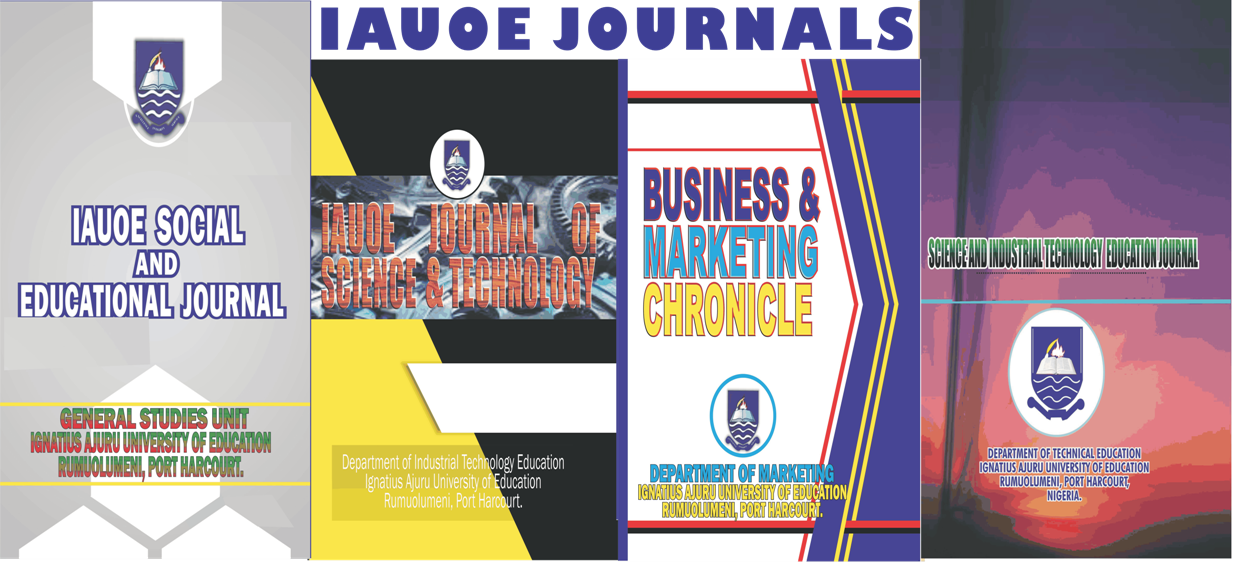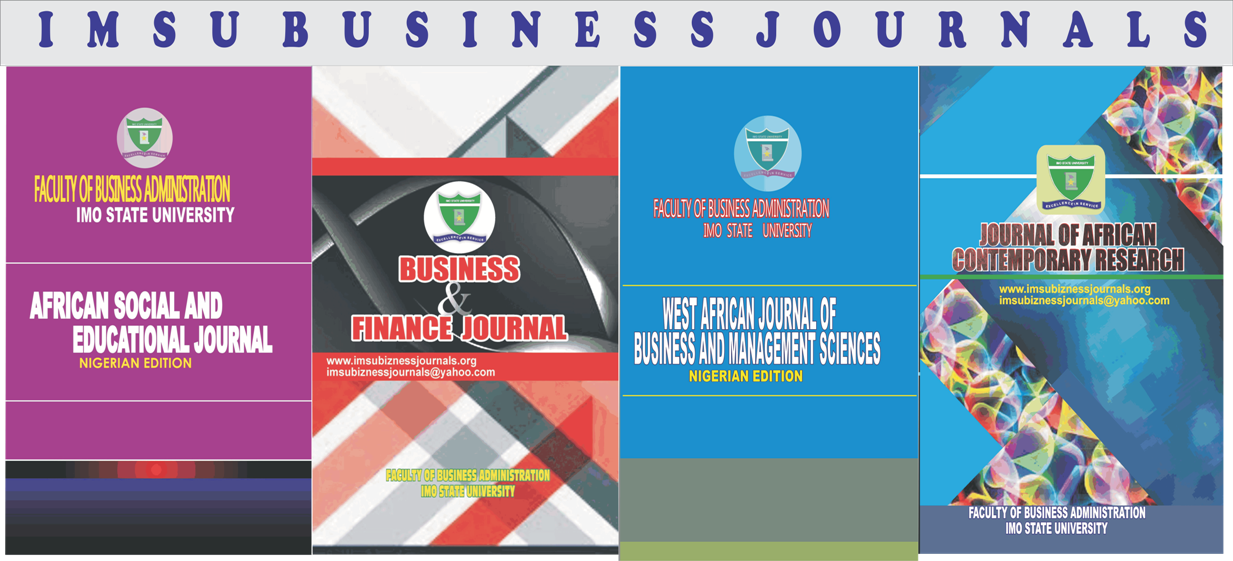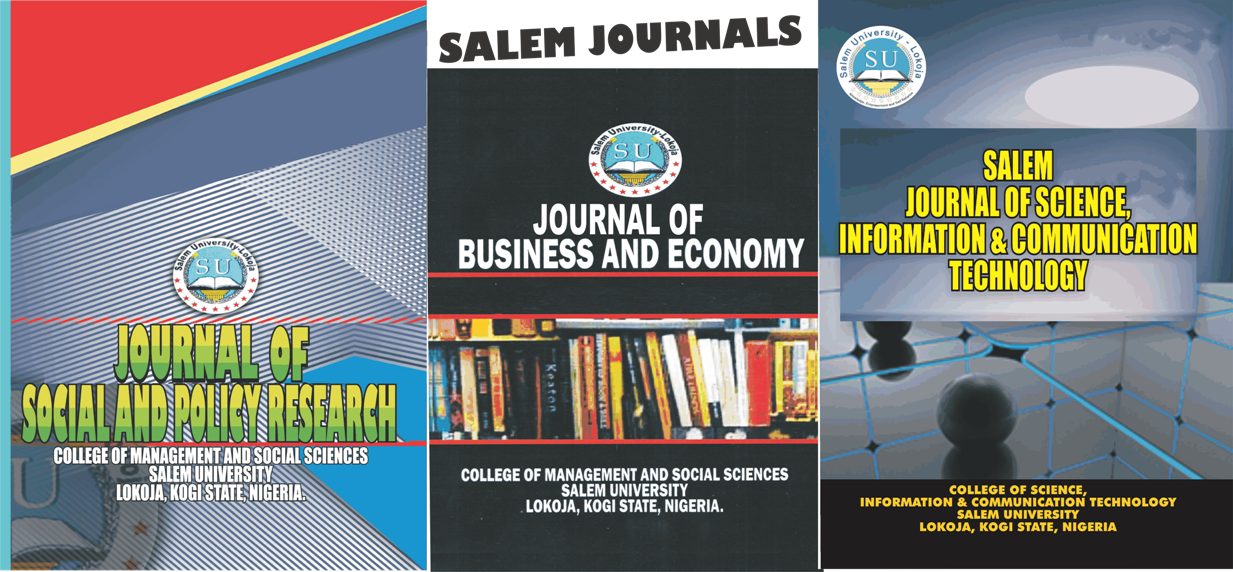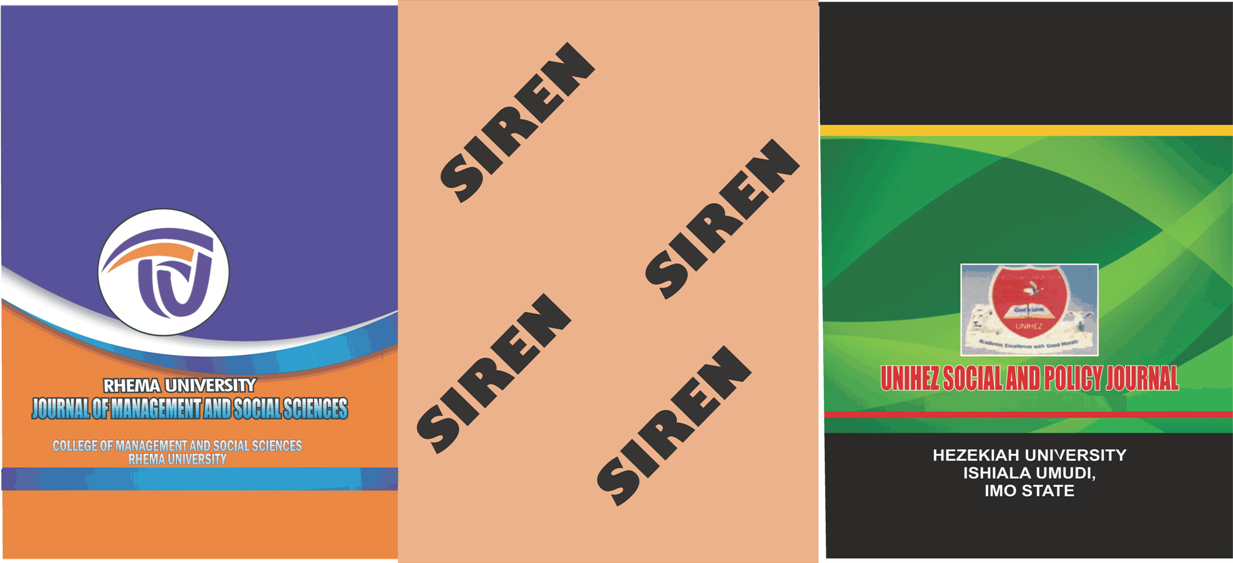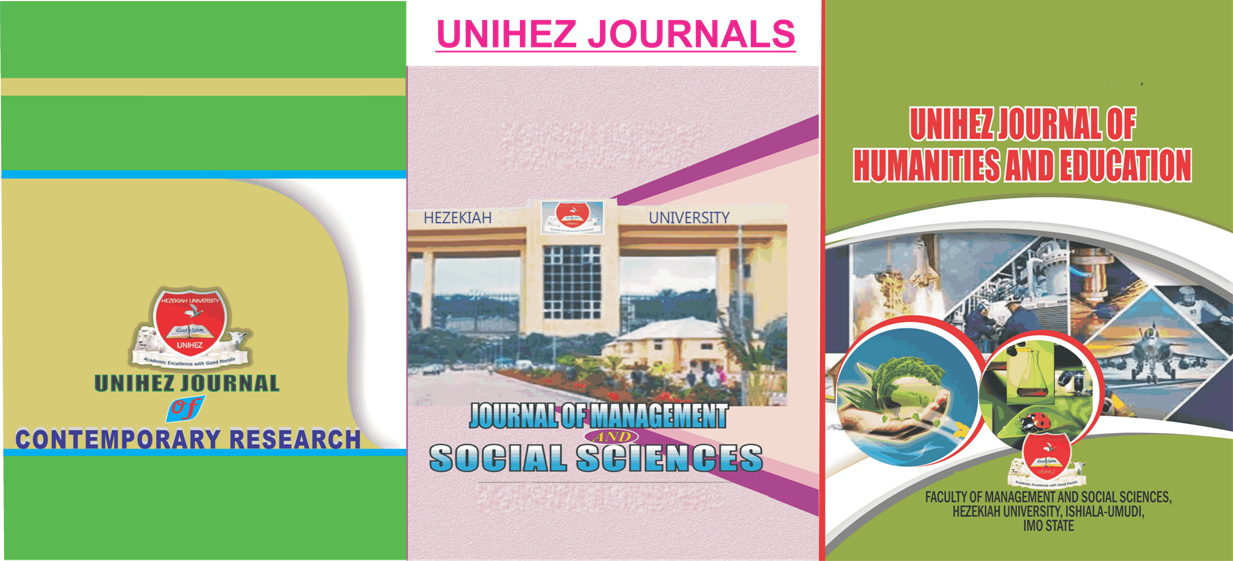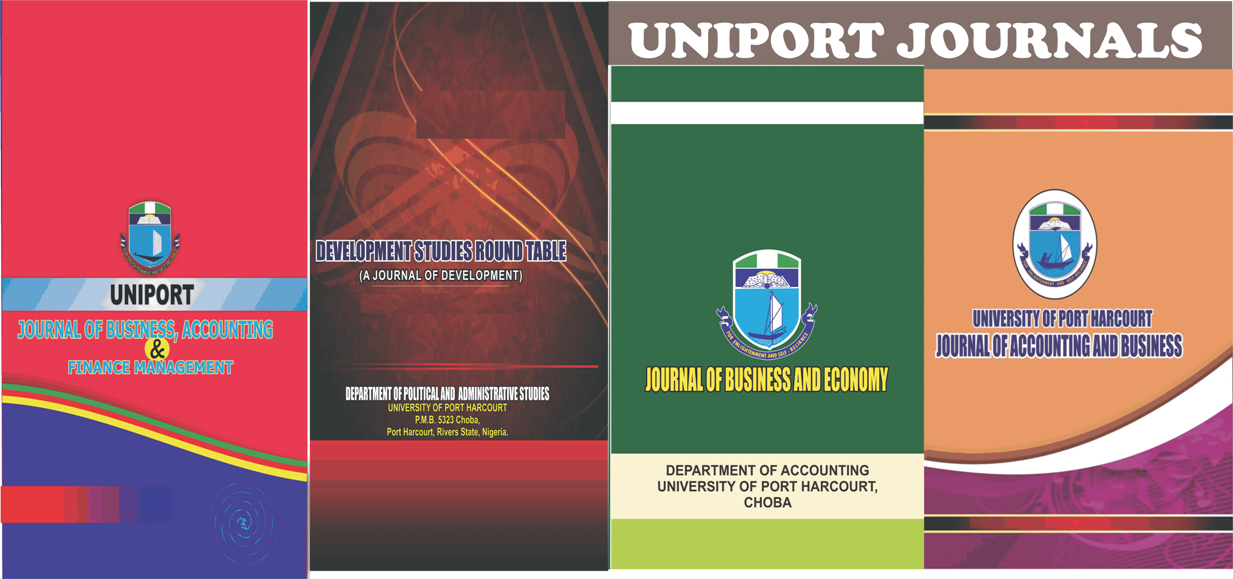2019 Archive
| 1 |
Title: OIL EXPLOITATION AND EMERGENT YOUTHS’ DEVIANT PROCLIVITIES IN HOST COMMUNITIES IN DELTA STATE OF NIGERIA.pdf Author: OGEGE, SAMUEL OMADJOHWOEFE, PhD. Abstract: Abstract This paper aimed at examining the activities of the multination oil companies that inevitably ushered in emergent deviant proclivities among youths in the Niger Delta. The authors an empirical approach in analyzing the relationship between oil companies’ activities and emergent deviant behaviour in youths. A total of six host communities in three local government areas in Delta State were selected through lottery a variant of simple random sampling techniques. Data gathered through qualitative observational technique of Focus Group Discussion were analysed using the multidimensional scale. The results reveal that the youths forcefully jettison Institutionalised norms and values as non conformist for reactions as survival strategy to the negative impacts of multi-national companies’ activities in their communities. View |
| 2 |
Title: PARTY POLITICS AND IMPEACHMENT IN NIGERIA’S FOURTH REPUBLIC AN ASSESSMENT.pdf Author: S. S. AVIDIME, PhD. AND J. DAVID AGABA Abstract: Abstract The paper attempts an analytical presentation on the link between impeachment and democratic consolidation in Nigeria drawing from the experiences of the spate of impeachments from the five states of the federation i.e. Bayelsa, Oyo Plateau, Ekiti and Anambra States of the federation. The research notes that impeachment is multidimensional, encompasses the three organs of government: the legislature, executive and the judiciary. It focuses on executive-legislative relations in the Fourth Republic. The research also observes that ordinarily, impeachment is meant to strengthen a democratic process when carried out according to the constitutional laid down procedures. However, in Nigeria, impeachment became a tool of political vendetta, used to fight perceived political opponent hence threatening the political and democratic stability of the country. These has been facilitated by the monetization/commercialization, trivializing and striving on the power of impeachment with establishment of the Economic and Financial Crimes Commission (EFCC), the enshrinement of the politics of godfatherism as well as the politicization of the police and the military which are ready tools in the hands of the political fat cat. The strongest recommendations of the research therefore, is the need for the establishment of centre for executive-legislative studies whose duties will be to organize workshops, seminars and symposia to further educate these categories of people. View |
| 3 |
Title: THE ADUGUBAI AND IGBU DANCES IN KOU COMMUNITIES BURIAL RITES.pdf Author: HENCHARD B. EREZENE, PhD. Abstract: Abstract Dance as a non-verbal means of communication serves various purposes. It entertains, expresses emotions and circumstances, exhibits the culture of a people, and even shows class distinctions in society. As part of their culture, serving any of the aforementioned purposes, Nigerians (indeed Africans) dance on various occasions – when a child is born, when someone dies, during festivals and worship ceremonies etc. In all these occasions, different types of dance are performed. This article focuses on the adugubai and igbu dances performed by the Kou, an Ijo group found in the Western Niger Delta sub-region of Nigeria, as part of their burial rites. The dances are only performed for men, but not for every man. They are only performed for some men of distinction when they die. The adugubai is performed for the chief/high priests of highly recognised and revered deities, and men who owned slaves. The igbu dance is also performed for chief/high priests of highly recognised and revered deities, but is in most cases, performed for men who had killed a human being, lion, tiger or leopard in their lifetime. View |
| 4 |
Title: FRENCH LANGUAGE IN NIGERIA FROM THE CLASSROOM TO THE LABOUR MARKET.pdf Author: SUNDAY OKPANACHI Abstract: Abstract In 1996, the Nigerian government declared French as the country’s second official language. From legal and policy view points, the environment could not have been better for the flourishing of the language. However, classrooms in Secondary Schools and lecture halls in Universities have continued to witness diminishing student enrolment for French language programmes. Many researchers have adduced as many reasons for this decline of interest in French language by students and parents in spite of the favourable policy environment. But one striking reason peddled is that which attributes the declining interest in French to the lack of relevance of the language to present day Nigerian labour market. This misrepresentation further de-markets French language amongst students. This article discusses the various motivations of students for the learning of French as a foreign language in Nigeria. Concluding that the motivations are more instrumental than integrative, it further unveils abundant tapped and untapped employment and job creation opportunities for graduates who have acquired French language skills in the public, private, as well as, in the informal sectors of the Nigerian economy. View |
| 5 |
Title: CHALLENGES IN THE MANAGEMENT OF POSTGRADUATE STUDENTS IN NIGERIAN HIGHER INSTITUTIONS.pdf Author: BOBMANUEL D. BENNETT, PhD. Abstract: Abstract Postgraduate institutions in Nigeria have grown and developed tremendously since after independence in 1960. Postgraduate student population is so large that the carrying capacity of the institutions has been over stretched. Institutional authorities, therefore, encounter great difficulties in the management of students. Factors responsible for the crisis include poor funding resulting in shortage of infrastructures, lecturers and instructional facilities. Other issues include; diverse family and intellectual backgrounds of students and lecturers inability to provide effective teaching and supervision of students activities and learning achievements. Students awareness of their rights and freedoms without corresponding demonstration of their obligations, emergence of powerful student unions, cultism, rape, prostitution, stealing, bullying, fraud, vandalism and examination malpractices contribute to general indiscipline. Recommendations made to meet the challenges include; proper accreditation of the institutions and their programmes, increased funding to upgrade teaching and learning environment, more student-friendly school administrators and lecturers, better interactions and dialogue with parents, students and other stakeholders. View |
| 6 |
Title: AGRIPHOBIA IN CAREER CHOICE AMONG SENIOR SECONDARY SCHOOL STUDENTS IN PORT HARCOURT LOCAL GOVERNMENT AREA OF RIVERS STATE.pdf Author: B.S. NLEBEM, PhD. AND RAJI WALE ISAIAH Abstract: Abstracts The main objective of this study is to examine agriphobia in career choice among senior secondary school students in Port Harcourt local government area of Rivers State. Three research questions guided the study. Descriptive survey research design was adopted for the study. Yaro Yemene formula was used to select a sample size of 180 from the total population of 603 SS2 students used as respondents. “One hundred and eighty copies of the instrument were administered to the respondents out of which all was completed and returned. Data were analyzed using mean and percentage for the questions. Questionnaire was the main instrument used for data collection. The instrument was faced and content validated by three experts from agricultural education unit of the Rivers State University Port Harcourt, and the reliability used test Re-test method to measure the consistency of the instrument which yielded a reliability coefficient of 0.87. The findings revealed that majority of the respondents have a right perception towards Agriculture, students agreed that agriculture is a lucrative profession, agriculture guarantees a satisfied future if chosen as a future career. Respondents also disagreed that agriculture is a course for the low intelligent, domestic oriented course and not meant for only the poor ones in the rural areas. The study also revealed that parental and peer influence, environmental factor such as land unavailability, lack of adequate employment opportunities in agriculture, influence of teachers of agriculture, drudgery involved in agriculture among others are the causes of fear of choosing agriculture as a career. The study recommended that teachers of agriculture should imbibe teaching method that will stimulate students’ interest to agriculture, use of scholarship schemes in department of agriculture, establishment of mechanized farms in secondary schools among others. Keywords: Agriculture, Agriphobia, Career, and Career choice. View |
| 7 |
Title: LET US THEREFORE FOLLOW AFTER THE THINGS WHICH MAKE FOR PEACE AND THINGS WHEREWITH ONE MAY EDIFY ANOTHER LET HIM TURN AWAY FROM EVIL AND............pdf Author: VEN. VICTOR O. A. ELLEH Abstract: Abstract The New Testament does not give systematic definition of the church but offers a broad spectrum of images that try to introduce us to the reality of the church, both earthly and transcendent, and invite us to embrace reality. Among the most striking images are the church as the people of God as the body of Christ as the temple of the Holy Spirit, where the holiness of God dwells on earth as a communion (nature and mission of the church, 19-24). One of the major distinctive features of the church is its being a sign of peace and reconciliation. In its liturgy the church remembers and represent how God reconciled the world through Christ and the Holy Spirit. Indeed, the bible is an act of memory of what God has already done for us in Christ’s life, death and resurrection. This research using biblical historical method to find and the place of peace in human endeavor and to find out the window on the eschatological hope, that has been promised to us of the bringing together of all things. in the variegated ways this study focuses on the major role of the church on peace and reconciliation. They call us to share this peace with each other and to carry it into the world. Despite our shortcomings and failure as human beings, God’s peace can be experienced in the life of individuals, in family, in partnerships, and in community. Peace and church unity. The various images by means of which the New Testament describes church, the (body as temple etc.) unambiguously show that the church cannot be one. This is the reason why divisions within the Christian Community have been perceived as early as the Apostolic times, to be a factor distorting the very character of the church as a sign of peace and reconciliation. This study is focused on the biblical history to find solution of peace using historical research methods. View |
| 8 |
Title: NEMBE AND KALABARI RELATIONS 1800 2015.pdf Author: MICHAEL, THOMAS B., PhD. AND IVORY, SABINA TONTE Abstract: Abstract The study examined intergroup relations and ethnic conflicts in the Niger Delta using the experience of Nembe and Kalabari relations from 1800-2015. It is a historic research on the emergence and development of a complex multi-ethnic society with and attendant complexity of issues especially of the seeming unending intergroup conflicts that bedevil the area. The relations between Nembe and Kalabari cover trade, war, peace, marriage and culture. As regards methodology, the primary and secondary sources were used to generate required data mainly from oral interview, intelligence reports, books, journals, and articles. The study also used multi-disciplinary approach to further enrich the available data. The study revealed that Nembe and Kalabari have a long period of relation which was influenced by historical ties, markets, and political divisions for administration convenience. The finding of the study also revealed that trade, war, diplomacy, socio cultural, political, Christianity, colonial and post-colonial factors influence the relations between Nembe and Kalabari. The study therefore, recommended that the Nembe and Kalabari should transcend inter-ethnic and sub-ethnic prejudices and accept one another as equal partners. Key Words: Intergroup Relations, Niger Delta, Nembe, Kalabari View |
| 9 |
Title: SCIENCE EDUCATION AS A FOUNDATION FOR POLITICAL STABILITY AND GROWTH IN NIGERIA.pdf Author: OMEODU, M.D. AND OGBONDA NJIDEKA NWAKAEGO Abstract: Abstract This paper focused on science education as a foundation for political stability and growth in Nigeria. Concept of science, education and science education; importance of science education, political stability how science education contribute to growth and development of Nigerian, and relationships of science education to political stability and recommended science education will be foundation for political stability and growth. The world is powerful and stable because of its scientific advancement. Scientific achievements have led to longer healthier and better lives. Science education prepares students to socially fit into the society they find themselves. The importance of science education to society is to produce literal persons (scientist) such as Chemist, Physicist and Biologist who are employed by state (politics) to research and find the sure ways of solving societal problems and later pass the findings to technologists. Engineer etc who put suitable forms to correct the situations. Like planning, materials to control population growth, drug control or cure diseases. The political stability is the durability of current government regime, which is determined based on the amount of violence and terrorism expression in the nation and by the citizens of the state. A stable society is one that is satisfied with the ruling party and their system of operation. The paper look at relationship of science education to political stability and growth in Nigeria looks at how Nigeria political economy and institutions determine the rate of growth and development which is based on technical issues like on the rate of stable, how a country mobilizes people, resources directed towards economic growth and development. The improvement of the lives of the people and how the educated create room for stability instead of instability based on the aforementioned points, Some recommendations of how science education provides a foundation for political stability and growth in Nigeria. The government and private sectors should be committed to the development of science education, provision on necessary science equipment in research institution, there should be training and the retraining of science educators to achieve the desired goals, encourage supportive relationship among science teachers and students. Raise the quality of science education within secondary and universities through conference, workshops seminar and training the trainee and award of scholarship. View |
| 10 |
Title: ASSESSMENT OF WOMEN IN RURAL AREAS, INVOLEMENT IN INCOME GENERATING ACTIVITIES FOR COMMUINTY DEVLEOPMENT IN OYIGBO LOCAL GOVERNMENT AREA, RIVERS STATE, NIGERIA.pdf Author: PETERSIDE, HENRY VINCENT, UGWOKE, NGOZIKA JOSEPHINE AND OBIOZOR ELIZABETH EBERE Abstract: Abstract The objective of this study was to assess the extent of rural involvement in income generating activities for community development in Oyigbo Local Government Area, Rivers State. To achieve this objective, three research questions were posed. A sample size of 650 rural women was drawn using the simple random sampling techniques. Rural Women Involvement in Income Generating Activities for Community Development Questionnaire (RW1GACDQ) was the data collecting instrument for the study. The instrument was subjected to face validity by three in adult education and extra mural studies department from the University of Nigeria, NSUKA. The reliability coefficient value of 0.88 was obtained through the Pearson Product Moment Correlation Coefficient (PPMCC). Data obtained from the respondents were analyzed using the mean. The findings revealed that rural women were involved in agricultural activities such as goat rearing, poultry farming, cassava processing, and palm oil processing, for non-agricultural activities, the study revealed that rural women did not involve themselves in tailoring, soap production, bead making and weaving. It was recommended among others that agricultural extension agents should expand their scope to accommodate varieties of agricultural activities like piggery, fish feeds, and snail rearing in addition to cultivation of crops. Keywords: Rural areas, rural women, income generating activities, community development. View |
| 11 |
Title: THE REVISED 9 – YEAR BASIC EDUCATION CURRICULUM (BEC) IN NIGERIA IMPERATIVES FOR ETHICAL IMPLEMENTATION.pdf Author: ADOKIYE ADOLPHUS OKUJAGU, PhD. Abstract: Abstract Revision of any curriculum is a reflection of changes or exigencies in the society, thus, curriculum change is akin to societal changes. In Nigeria, the 9- year Basic Education Curriculum (BEC) has been revised to accommodate certain emerging issues and challenges of both local and global concern. Implicit in this curriculum revision is that more potent and viable ways or strategies must be devised to implement it effectively after the cause or causes of the revision have been well understand and digested. Understanding causes that necessitated revision in the curriculum is the key to its implementation. It is in the light of the above that this paper presented a review of the concepts ‘curriculum’ and ‘curriculum change’. Certain drivers of curriculum change were discussed as well and some factors for ethical implementation of the revised curriculum were proposed. The paper also stated a paradigm shift of attitude to positivity, robust improvement in instructional infrastructure, and holistic human capacity development, among others, as recommendations. Key words: Basic Education, Curriculum, 9 years Basic Education Curriculum, Curriculum Change, Structure. View |
| 12 |
Title: DISCOURSE ON JIHAD A QUEST FOR DIALOGUE (EXCERPTS FROM “ISLAMOLOGY” BY PROF .A. KILANI).pdf Author: UZOKA, UDEMAGWUNA ISAAC AND LONGE, KINGSLEY KAYODE Abstract: Abstract The concept of Jihad in Islam is mostly mis-understood and abused by few Moslem groups and non-Moslems at large these days, as it is assumed to be synonymous with “waging holy war”, “terrorism” or “killing of infidels”. Unfortunately, this mis-presentation has created a dent on the Islamic religion as these indiscriminate and incessant slaughtering of the innocent citizens, uncontrolled violence and restiveness is a stigma to Islam in the comity of peaceful religions of the world. In order to dis-abuse these wrong notions among the few Moslems and non-Moslems, Professor Kilani, a re-knowned Islamic Scholar explicates on the various modes of jihad, the lesser and the greater on whose base the writer attempts to explain the need for continued dialogue between the Moslems and non-Moslems and Importance of teachings on Jihad using the Quran to support the argument. The Quran advocates forgiveness, pardon and tolerance for the non-Moslems; “ ‘’ which is complemented by Surah 60:8 the term “holy war” is no where found in the Quran but rather Islam is for the promotion of peace and tolerance except in the case of self-defence, aggression and oppression of any kind is abhorred by the Quran Surah 8:60-61 “ ‘’ except in the fight for justice “2:19, 22:41” where the command is to even protect churches, synagogues, temples and mosques from attacks. The method used is the qualitative with emphasis on the Quran. View |
| 13 |
Title: THE CONSEQUENCES OF SOCIO – ECONOMIC AND POLITICAL CRISIS IN NIGERIA.pdf Author: NWINADUM GBENENEE, PhD. AND CELESTINE POROMA, PhD. Abstract: Abstract Social crisis could be corruption, ethno-religious, war, genocide or political which effects are destruction of properties, waste of resources and hence, inefficient utilization of resources. Though, Nigeria is blessed with abundant natural and human resources, however the country has always been in one crisis or the other ranging from corruption, ethnic and religious to political crises. This study therefore, examines the geography of global social crises in Nigeria. KEYWORDS: Crisis, Society, Economy, Politics, Impact, Values. View |
| 14 |
Title: EMBEDDED SYSTEMS SECURITY.pdf Author: BASAKY, FREDERICK DUNYA, PhD. Abstract: Abstract An Embedded system is an electronic product that contains a microprocessor (one or more) and software to perform some constituent functions within a large entity. Embedded systems security is a new and emerging area of research. It is the meeting point of many disciplines such as electronics, logic design, embedded systems, signal processing and cryptography. It is closely related to the area of information and software systems security because software is an integral component of any embedded system. Not long ago, it was thought that only software applications and general purpose digital systems i.e. computers were prone to various types of attacks against their security. The underlying hardware, hardware implementations of these software applications, embedded systems, and hardware devices were considered to be secure and out of reach of these attacks. However, during the previous few years, it has been demonstrated that novel attacks against the hardware and embedded systems can also be mounted. Not only viruses, but worms and Trojan horses have been developed for them, and they have also been demonstrated to be effective. Whereas a lot of research has already been done in the area of security of general purpose computers and software applications, hardware and embedded systems security is a relatively new and emerging area of research. This paper explains the details of knowing and understanding the security risks associated with embedded systems and how to mitigate them. It also provides details of various types of existing attacks against hardware devices and embedded systems, analyzes existing design methodologies for their vulnerability to new types of attacks, and describes solutions and countermeasures against them for the design and development of secure systems. The paper explains some of the most current security risks associated with embedded systems and how to address them in personal devices. It also looks at some of the security concerns in embedded systems around the world and how their architects are working to keep them secure View |
| 15 |
Title: SMALL ARMS AND LIGHT WEAPONS THE MALI WAR AND INTERNATIONAL INTERVENTION.pdf Author: TIMOTHY UBELEJIT NTE, PhD. Abstract: Abstract The Mali War began on 16 January 2012 with the Tuareg rebellion. Skirmishes of attack are still ongoing despite the ceasefire agreement that was signed on February 19, 2015 in Algiers. The conflict was majorly between Northern Mali and Southern Mali. The objective of the study is to examine the relationship between the Tuareg rebellion and the Mali War; to assess the role played by the proliferation of small arms and light weapons in intensifying the conflict; to evaluate how the intervention of the international community led by France paved the way for peace in Mali. The theoretical framework of the study is a blend of the Power Theory and the Clash of Civilization Theory. The qualitative research methodology was adopted for the study. It consists of content and documentary analysis whereby data was gathered mainly through secondary sources and reviewed. The study found out that the Mali War was caused by the Tuareg rebellion and aggression and the proliferation Small Arms and Lights Weapons aggravated the conflict. The Tuaregs were the major insurgents and aggressors. They declared war against the Malian government in a bid to secede and their grievance was independence for the Azawad or Northern Mali. Conversely the intervention by the international community led by France ameliorated the conflict. The study recommends that more states should be party to the Firearms Protocol which entered into force in July 2005. Firearms production and trade are highly lucrative businesses but this should not be sacrificed in the alters of so much bloodshed from conflicts triggered by the proliferation of small arms and light weapons. View |
| 16 |
Title: THE INFLUENCE OF TEACHERS’ QUALIFICATION ON ACADEMIC PERFORMANCE OF SENIOR SECONDARY SCHOOL STUDENTS.pdf Author: S. N. ORDU, PhD. Abstract: Abstract This study examined the influence of teachers’ qualification on academic performance of senior secondary school students in Emohua Local Government Area of Rivers State. The researcher therefore adopted the survey method. The population of the study comprises of all senior secondary school students drawn in Emohua Local Government Area of Rivers State which is estimated to be 1,675 teachers that make up the population of this study. source: Emohua Zonal Schools Board. 3,036 Secondary SS1 students represented 20 percent of the total population form the sample size. The instrument used for data collection was teachers’ qualification on students’ academic performance inventory constructed by the researcher. This instrument was validated by two experts in Measurement and Evaluation in the Department of Educational Psychology, Guidance and Counselling Ignatius Ajuru University of Education. The reliability was measured using test re-test reliability technique. The coefficient obtained were .67 which shows that the instrument is valid. Independent t-test was used to answer research question and hypotheses. Results shows that both the principals and the teachers agree that the teachers use instructional materials to teach regularly, but not consistently. Needs of students, lesson objective, nature of the subject, requirement of the education law, and the influence of teachers professional training are the things that make teachers to use instructional material to teach government. Based on this study the following conclusions were drawn. Teachers use instructional materials to teach but not so regularly. The visits of school inspectors and the principals coercion make it look as though the teachers use them regularly. The needs of the students, the lesson objectives, the nature of the topic, the education law requirements and the teacher’s professional training make them to use instructional materials to teach. The reactions of the students to the lesson and the instructional materials give teachers ideas of success or failure of the instructional materials used in the lesson. View |
| 17 |
Title: UTILIZATION OF E- LEARNING IN NATIONAL TEACHERS INSTITUTE RIVERS STATE.pdf Author: EUNICE C.VICTOR – ISHIKAKU, PhD. Abstract: Abstract This study examined the utilization of E-Learning in teaching NCE students of National Teachers Institute (NTI) Rivers State. The aim of the study is to determine the extent of the use of E-Learning in teaching NCE students of the institute and the attitude of the facilitators to its use. The research design used for the study was descriptive survey design.150 respondents were randomly selected from a total population of 520. Data was collected using a questionnaire tagged (UETE) which has a reliability coefficient of 0.70. The instrument was validated by two validates from the department of education technology. Two research questions and two hypotheses were raised for the study. Percentages, Mean, Standard Deviation and t- test were used for analysis. The two hypotheses were tested at criterion mean of 2.50 significant level. 83.3% of teachers agreed to the use of E- Learning for instruction while 16.7% disagreed to its use and perceived benefits to the student’s teachers of NTI. The findings show that, although the attitude of NTI facilitators towards E- -Learning was positive E-Learning is yet to be adopted as instructional strategy in the National Teachers Institute, Rivers State. Keywords; E-learning, Utilization, National Teacher’s Institute, National Certificate of Education (NCE) View |
| 18 |
Title: LEADERSHIP DEFICIT AND CHALLENGES OF GOOD GOVERNANCE IN THE MANAGEMENT OF UNIVERSITIES IN BAYELSA STATE.pdf Author: DAMINABO, DAGOGO A. F. (Ph.D) & IGBANIBO, FOUNDATION SLINK Abstract: This study examines leadership deficit and challenges of good governance in the management of universities in the study area. The study employed descriptive research design. The population for the study is 3000 and it consists of all the senior and junior university management staff in Bayelsa State. Stratified random sampling technique was used to select 340 respondents for the study. The research instrument for data collection was Leadership Deficit and Challenges of Good Governance in the Management of Universities Scale (LDCGMUS), which was validated using Cronbach alpha reliability that yielded a reliability coefficient index of r=73. Mean and standard deviation were used to answer the four research questions and t-test was used to test the four null hypotheses at 0.05 significant levels. The findings of this study indicated low accessibility of staff and students to ICT facilities due to lack of computers, corruption and poor accountability of policy implementation leading to poor job satisfaction and low productivity in the universities in Bayelsa State. Based on these findings, the researcher recommends among others that the government and stakeholders should make it an obligation to monitor the university activities in all ramifications in an attempt to reduce corrupt practices of any kind in the system, encourage proper accountability in the system by holding persons to be responsible for their actions and inactions and make ICT availability and accessibility to staff and students in order to ensure good and efficient policy formulation and implementation in universities in Bayelsa State. Keywords: Leadership Deficit, Governance, Universities, Bayelsa State. View |
| 19 |
Title: PERCEIVED SOCIAL CITY DISORDERS AND THE NEED FOR URBAN PLANNING IN NIGERIA-IMPLICATIONS FOR SUSTAINABLE URBAN ENVIRONMENTAL MANAGEMENT.pdf Author: PORONAKIE, N.B. (Ph.D) & WOSU, B. I. Abstract: This paper examines the consequences of unplanned development structure on a physical setting and its implications for sustainable urban environmental management in Nigeria. Certainly, when things are left unplanned or allowed to evolve on its own, a chaotic spatial structure including other deviant behaviours are created against the aim of urban planning as a control mechanism. These chaotic spatial structures that emerged produced “social city disorders” which constitutes urban nuisance due to unplanned spatial development or poor urban environmental space. They include problems like unemployment/underemployment, housing, traffic congestion, inadequate urban amenities, poor sanitary conditions or environmental deterioration/pollution. As a control mechanism, urban planning is concerned with the design, growth and management of urban life; and to provide spatial arrangement of activities deemed better than the existing pattern without planning. Today, everybody particularly the politicians claimed to be pocket planners, creating complex problems than solving them through corruption and mismanagement of public funds/resources. Thus, planning an urban environment to meet specific requirements involves systematic or scientific methods to investigate reality for policy making and enforcement. This provides relevant authorities with the power to enact environmental laws which significantly regulates the direction and nature of spatial development and implementation in urban space. The paper thus recommends among others, the adoption of urban planning in Nigeria, adequate provision of urban amenities, all planning activities must be in accordance to specifications etc. Keywords: Plan, Urban Planning, Unplanned Development, Urban-Disorders, Nigeria. View |
| 20 |
Title: THE ROLE OF ADULT EDUCATION INTERVENTION IN AGRICULTURAL REVOLUTION PROGRAMME-A CASE STUDY OF RIVERS STATE.pdf Author: EPHRAIM WORDU (Ph.D) AND C. S. EGUMAH Abstract: This study focuses on the role of adult education intervention in agricultural revolution programme (ARP) in Rivers State. The study adopted descriptive design. The population of the study were 1,500 participants of National Directory of Employment (NDE) programmes. A sample of 150 participants was selected. The instrument was a self-made questionnaire titled “The role of adult education intervention in agricultural revolution programme (RAEIARP)”. The validity of the questions was ascertained by experts in measurement and evaluation. A reliability index of 0.81 was obtained. The results of the study showed that adult education intervention does not play positive role in agricultural revolution programme (ARP) in Rivers State (NDE). The Study therefore concluded that in Nigeria, adult education is disvalued by the political class as evident in the very low budgetary allocations and release to adult education. In addition to this, there is lack of political will, poor accountability measures, transparency deficits and corruption among the elite, not what is ought to be in Rivers State, which means that it is not. The study recommended among others, decentralization of decisions making using local government councils in order to achieve results, and support to trainees through provision of the resources for the effective utilization for their knowledge and skills after graduation. Keywords: Adult Education, Agricultural Revolution Programme, Socio-economic Development. View |
